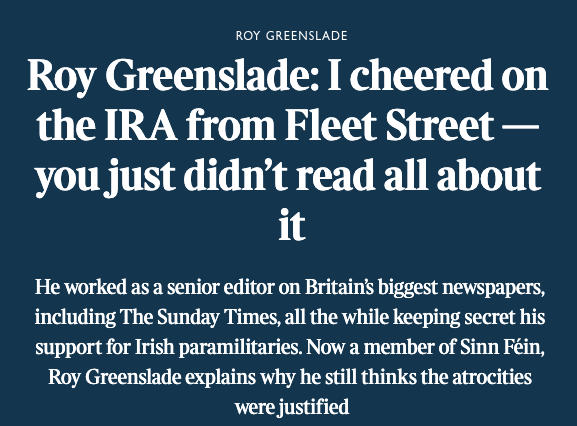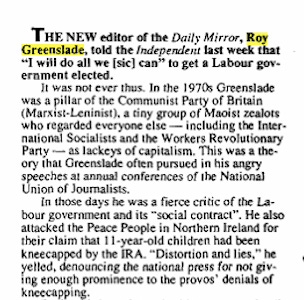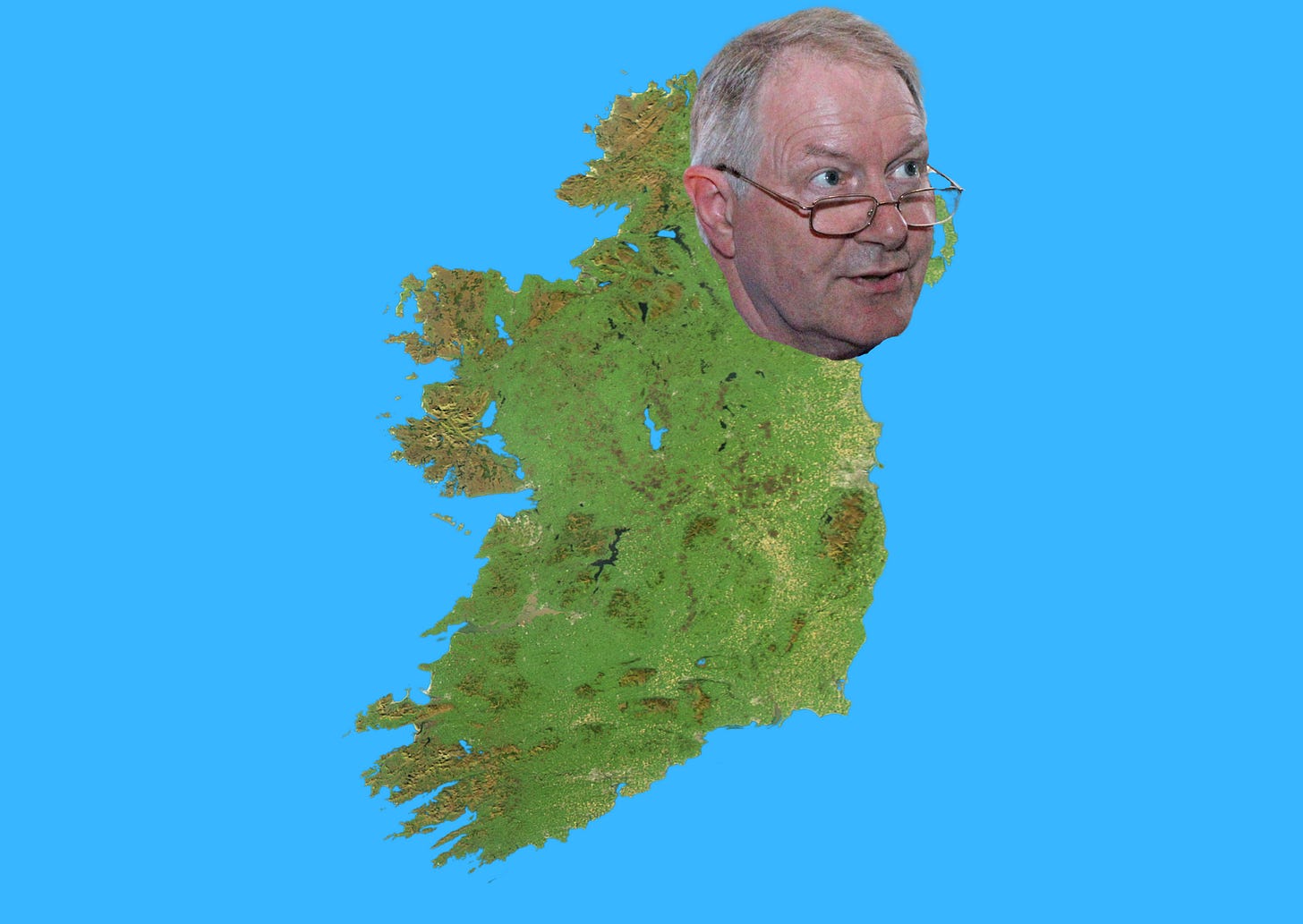The fields of AthenROY: Roy Greenslade's 'revelations' about his support for the IRA say a lot about British journalism then and now
It's hypocrites all the way down.
The ‘revelation’ that Roy Greenslade — the journalism professor, ex-editor of The Daily Mirror, former Sunday Times executive, Sun alumnus, and long-time Guardian media columnist — is a supporter of Irish Republicanism was about as shocking as discovering a bear evacuating its bowels in a wooded area or the pope perusing an emporium dedicated to ridiculous headwear.
The abstract which accompanies a recording of Greenslade, made in 2007 for the British Library’s Oral History of British Journalism, states baldly “RG has pro-republican views”. In the interview, Greenslade talks about an incident when he put on an Irish accent to pass information given to him by Sinn Féin contacts to a colleague at The Sunday Times.



Nick Davies named Greenslade as a pseudonymous contributor to the Sinn Féin paper, An Phoblacht (The Republic) in his 2008 book Flat Earth News. In a section about The Sunday Times’ attempts to discredit the Thames Television documentary Death on the Rock (1988), Davies writes, having been told the story by Greenslade:
“… some staff tried to fight back. Peter Hounam, who had left [the paper’s investigations team] Insight… but stayed on the paper, managed to run a news story casting some doubt on the Ministry of Defence version of events. He was backed in this by the managing editor for news, Roy Greenslade, who was provoked into one particularly bizarre manoeuvre in his efforts to let some light into the story.
Greenslade believed in the Irish republican cause and occasionally wrote for the Sinn Féin paper, An Phoblacht, but discreetly hid his work behind the pseudonym George King (i.e. the opposite of King George).
When Greenslade’s Sinn Féin contacts gave him some useful information about the Gibraltar shootings, he felt unable to pass it on openly, fearing that it would be rejected simply because of its republican source. Instead, he resorted to the unusual tactic of making a series of phone calls to Peter Hounam in which he faked an Irish accent and posed as the friend of an airline pilot who had overheard the SAS talking.” 1
An unsigned Sunday Times article, published in January 1989, admitted that there were errors in its stories about the documentary. In 1990, Greenslade was appointed the new editor of The Daily Mirror by its then-proprietor Robert Maxwell. During his time in charge, he was involved in a scandal about a fixed ‘Spot the Ball’ competition which offered a £1 million prize but which was impossible to win. His brief tenure as editor ended in March 1991.
The story has been revived by Greenslade’s vainglorious decision to write about his years of hiding his support for the IRA while working on newspapers. His article appeared first under the title What I Did In The War in the British Journalism Review but was reprinted yesterday, rather fittingly, in The Sunday Times with the more forthright headline I cheered on the IRA from Fleet Street — you just didn’t read all about it.
The Sunday Times also ran a front-page story based on Greenslade’s piece, headlined for the print edition Double life of Fleet Street editor who secretly supported IRA bombings. It’s apparent from not only Greenslade’s British Library interviews and Nick Davies’ book but comments from both his current and former students at City’s Department of Journalism that if it was a secret it was so open that it may as well have planted pampas grass in its front garden.
What turned this old news into a fresh story was not that Greenslade is a supporter of Irish Republicanism or even that he is a member of Sinn Féin but that he writes specifically about the IRA’s bombing campaign:
I came to accept that the fight between the forces of the state and a group of insurgents was unequal and therefore could not be fought on conventional terms. In other words, I supported the use of physical force.
In 1976, having belatedly started a university degree course, I began to see comparisons between the Irish republican struggle and similar conflicts elsewhere in the world.
To pay for my studies, I worked part-time as a sub at the Sunday Mirror. So, naturally, I continued to keep my views on the IRA to myself. However much I believed its tactics to be valid, I could not hope to convince colleagues that the killing of civilians, albeit by accident, was justifiable.
Using an explanation that will be familiar to anyone who has talked to Daily Mail journalists who privately decry their paper’s output but explain they ‘need’ to work there, Greenslade says he worked for and even edited papers that had editorial lines which were the fundamental opposite of what he claims are deeply held beliefs because he needed the money and preferred being a journalist to other options:
I knew that to own up to supporting Irish republicans would result in me losing my job. I could have taken that step myself by walking out on principle. But the idea of forsaking a Fleet Street career — indeed, a career of any kind in journalism — was unthinkable.
I couldn’t conceive of doing anything else. Join an agitprop publication? I couldn’t see a future there. Become a librarian, a schoolboy dream? It wasn’t really a feasible alternative. Anyway, I needed a wage because I was on the verge of taking on a mortgage. Better, then, to button my lip and carry on.
Greenslade is married to Daily Mirror journalist Noreen Taylor, who was born in Donegal and raised in Glasgow. They have a house in County Donegal, where they now live, and where Greenslade became friends with Pat Doherty, the vice-president of Sinn Féin from 1988 to 2009, who is also alleged to have been a member of the IRA’s Army Council.
In 2013, Greenslade stood surety for John Downey, who was suspected of involvement in the 1982 Hyde Park bombing. Downey did not ultimately stand trial because a ‘letter of assurance’ issued to him by the government as part of the Good Friday agreement promised that he would not be prosecuted for alleged crimes during the Troubles.
Greenslade says in his article that he wrote it to reply to ‘various critics’, but that explanation also has a strong whiff of ego and self-satisfaction about it:
I have decided, at last, to address this matter of my covert political beliefs because various critics — some named, many more remaining anonymous on Twitter — continue to make much of my supposed “exposure”. They include Stephen Glover, Charles Moore, Ruth Dudley Edwards and Ed Moloney.
I have refused to respond to them, but it has been increasingly clear that my never-complain, never-explain non-response to criticisms has been inadequate. It implied that I am unwilling to justify what I have done. So, having given up full-time journalism and become a member of Sinn Féin, I want to place in context my reasons for being a republican and my passionate wish to see a united Ireland. At the same time, it enables me to provide coherent answers to those questions asked by my grandsons.
That reads like a statement from an embattled royal or a celebrity tired of the mosquito bites from gossip magazines. It is like Greenslade is the Norma Desmond of minor Fleet Street figures, making his grand return and settling some scores while he does it. After talking about his “covert political beliefs” in print and on tape several times over the years, this feels less like a decision to “come out from hiding” and more like a last-ditch bid for attention.
I believe that the British government’s collusion with Loyalist terrorists and the murder of Irish civilians by British forces, both overt and covert, are tolerated by the British media when Republican violence isn’t. But I also think that Greenslade is a coward and a tourist, a hypocrite who preferred to take the money than to stand up for principles he claims to passionately support. As he became bolder about his beliefs towards the end of his career in journalism, he also used his pulpit as The Guardian’s media columnist to attack colleagues who reported on the conflict.
On March 2 2012, Henry McDonald, then The Guardian’s Ireland correspondent, reported that “Republican paramilitaries [had] been blamed” for the killing of a Belfast man, Christy Mackin, who had been alleged to have been dealing drugs. McDonald attributed the suggestions to “Republican sources in Belfast”.
Four days later, after a statement by the PSNI stating that it was “not looking at paramilitary involvement” and the arrest and charge of a man and woman for the murder, Greenslade wrote a stinging attack on McDonald for the Guardian Media Blog. The piece, from March 6 2012, is still up. Greenslade wrote:
What concerns me about The Guardian story was the message that it sends. I am not in any doubt about the threat posed by republican dissidents.
But it is clear that this small group feeds off any publicity that implies it is larger and more active than is really the case.
The net effect of the headline and story is to bolster the "prowess" of a group that wishes to pursue a murderous armed campaign.
There is a second, slightly more sinister, message too. The use of the word "republican" in such a context tends to taint the republican movement as a whole, meaning Sinn Féin.
Reporting in Northern Ireland remains a sensitive matter and this inaccurate report, sadly, was anything but sensitive.
In the comments of that piece, Greenslade was asked why he hadn’t mentioned his connections with Sinn Féin and he replied:
Surely you wouldn't expect every journalist to append their political affiliation and/or religious leanings to their articles? But let me state unequivocally that my "sympathies and support" are for fair and honest journalism.
I’ve written about hatred of journalists failing to disclose conflicts before in this newsletter. I find Greenslade choosing not to mention his past writing for Sinn Féin’s newspaper and speaking at one of its conferences as disreputable as James Forsyth’s ongoing failure to declare his intimate connections to the Johnson government.
Greenslade gave The Sunday Times and The Daily Mail a free hit with his self-aggrandising piece. It is easy for them to moralise because, despite various mealy-mouthed formulations, Greenslade seems to excuse cold-blooded murder, including the murder of children. That the press clutching their pearls at Greenslade’s opinions spent much of the past week crowing about a trafficked young woman being made stateless and decades ignoring or underplaying state collusion in terrorism won’t blunt that charge.
Nor will the fact that, despite secretly supporting the IRA, Greenslade followed the editorial line of the papers he worked at for many years, lining up behind their condemnation of the violence. His hypocrisy is just of a slightly less popular flavour than the more common Fleet Street varieties.
Greenslade has confessed to a rather monstrous kind of hypocrisy while hoping to paint himself as a quiet kind of hero. His critics, whose papers have excused or underplayed loyalist crimes and terrorism, and the state’s support of them, are playing out their usual hypocrisies — throwing their hands in the air in shock that one of their own is justifying violence. But there are columnists across the narrow political landscape of the British press who have justified all kinds of horror — in Northern Ireland, Iraq, Afghanistan and beyond — while they were still journalists. It’s just that their apologism was sanctioned by their bosses and supported by the paper’s editorial line.
If there’s any moral to Greenslade’s story it’s that the British media was and remains a place where most people hide their real beliefs in return for a salary. The rest? Well, they just ratchet up their worst thoughts, put them down on the page, and get jobs for life as columnists.
Davies, Nick. Flat Earth News: An Award-winning Reporter Exposes Falsehood, Distortion and Propaganda in the Global Media. Chatto & Windus, 2008.




